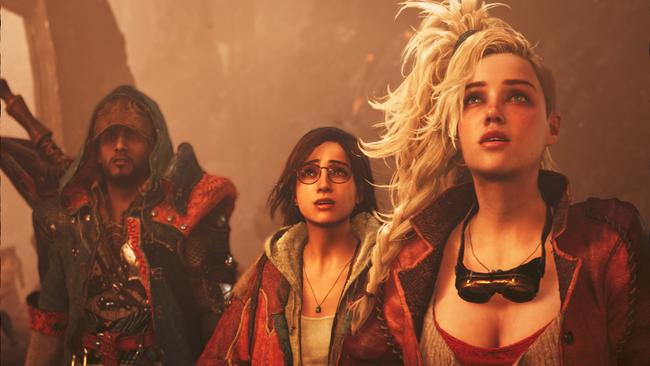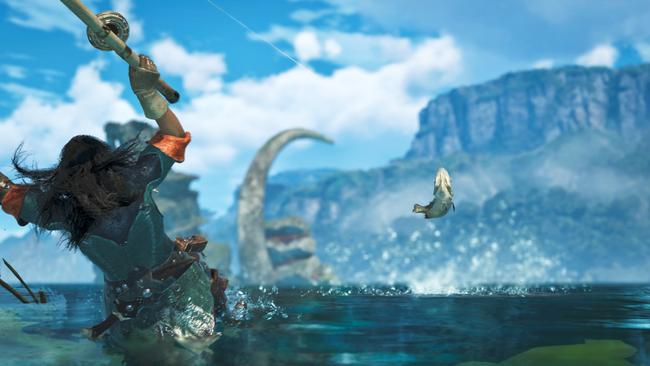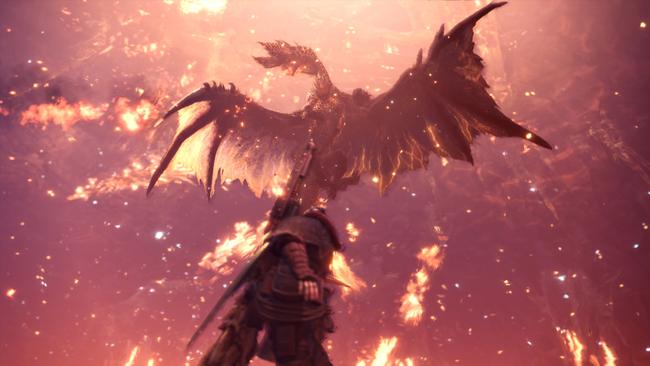
Capcom wants Monster Hunter Wilds to be a game players keep returning to
Sitting down to interview the team leads behind Capcom's upcoming Monster Hunter Wilds, the first thing that stood out to me was open ambition the team had, undeterred from Monster Hunter World's already massive sales numbers. Speaking through a translator, the game's director Yuya Tokuda made one thing clear from the jump - while Capcom was doubtlessly enamored with Monster Hunter World's success, they wanted more. Not just in terms of sales, but engagement; "I want to create a game that players will keep coming back to". He'd noticed that many players didn't necessarily stick around after playing Monster Hunter World, and it was this core conceit that drove the game's development from the start. While we sat down to talk with both him and Producer Ryozo Tsujimoto, it was Tokuda who was providing most of the answers about the team's goals with the upcoming release.
"We don't want people to quit playing the game; and we want them to accept the core gameplay loop of Monster Hunter. What can we do for the next title, with Monster Hunter World as a base, to keep players sticking around?" Throughout our discussion, at the heart of Monster Hunter Wilds' development was that core question; how could the team design a game that players would keep coming back to? While Title Updates are one answer, much as they were for Monster Hunter World, a greater piece of the puzzle was how to balance the depths of Monster Hunter's gameplay loop, while making it so that players don't feel the game pushing back against them.

At the heart of what makes Monster Hunter Wilds different compared to World is the newly expanded Season system; but one interesting wrinkle to that is that it bares resemblance to a similar feature that originally existed in the Japan-only Monster Hunter Dos. While the seasonal changes were never so extreme as what we've seen in Wilds, it was still worth hearing from the team about what - if any - input that ideas that were explored in past titles may have informed development on Wilds. After all, the team made it no secret that much of World's development was inspired by a desire to revisit core aspects of the series, by further focusing on immersion.
In response, Tokuda confirmed that - although it wasn't the only inspiration for the new system, Monster Hunter Dos was on the team's mind. "While the Seasonal system in Wilds wasn't completely inspired by Monster Hunter Dos, there's a lot we can learn when thinking about what previous titles did - whether they were received well, or poorly. When we thought about how we could expand about how we showcase the ecology in Wilds, coming from World, we did think about how nice it might be to have the world impacted by these extreme weather changes like in Monster Hunter Dos." For reference, Monster Hunter Dos featured a realtime seasonal system that dictated the types of quests players could engage in, and even which locations players could choose to hunt in. While it certainly added to the immersion, it meant that players were sometimes roadblocked from their progression, due to the game's design. The team, clearly, understood the frustration.
"The bad thing about the seasonal system in Dos, was that players couldn't change it themselves. Even if they were unable to hunt the monsters they wanted or needed to, they were unable to overcome that limitation without waiting. We thought if we could fix that, it might lead to a more engaging experience." The balancing act the team faces with ensuring that the game has the depth that players crave, while also making it easy for the game to get out of the way of players when necessary, appears to have been one of the core focuses of Wilds. Certainly, it helps contextualize what exactly they meant when Tokuda said he didn't want players to just quit the game.

Unsurprisingly, this dilemma has been the team's main focus not just with Monster Hunter Wilds, but even with Monster Hunter World, as Tokuda states: "The big focus out of the gate, was for general gameplay we want to make it simple and enjoyable for anyone. So anything that relates to the core gameplay - the hunt - we want to make it easy to engage with, and quickly usable." For some players, especially longtime fans, a level of friction of course was part and parcel of what we might have loved about the series; so any changes that go out of their way to ease that level of burden on the player is as much taking from the experience, as it is making it easier to continue playing the game unabated.
The team realizes this, which is why features such as endemic life exist; to leave room for players to engage with the game on that deeper level we might have been used to. While we didn't get a chance to talk about it during the interview, the new cooking system - where players must gather their own ingredients - would probably fall under that same classification. Both of these examples, of course, are directly impacted by the Season system. Some endemic life will only appear during certain weather, and as such some ingredients tied to them; certain monsters are more plentiful depending on the season, too. That depth still exists for players to seek out. The ceiling remains high, even if the floor has been raised considerably.
Closing out the interview, I asked the team how they felt about player reactions to some endgame monsters in Monster Hunter World that got some pushback by the playerbase; monsters like Lunastra, which basically required players to spec in Wind Resistance, and Alatreon which hard-locked players to using specific elemental weapons in order to avoid near-guaranteed deaths. To the team, it's part of the same philosophy as the rest of the game; since it's not required content, it's ok to inconvenience players to a degree. While you can of course use elemental weapons a monster is weak to in order to have an easier time with the story, it's not their intention to block players from playing how they want when they're going through the basegame. Endgame hunts and future postgame updates, though? They don't just want players to be able to use the same sets for every single monster.

"We didn't want to make it so that if you had a certain set you could just breeze through any endgame fight. It's not the gameplay we want players to have; for endgame hunts, we want there to be a distinctive difference compared to hunting story monsters". While Tokuda's words don't outright confirm it, it sounds like more monsters like those that heavily benefited from or even required specific builds might just be in the cards for postgame updates. Certainly it's a comfort that despite Wilds' continued streamlining of many of Monster Hunter's core features - the team is dedicated to designing aspects of the game that will continue to appeal to the hypervigilant players that will want a certain level of preparation required.
Sending us off, Tokuda had one final message: "We feel like we've managed the right balance between a focus on seamlessness and immersion, and we hope that players new and old both find something they can latch onto". Monster Hunter has grown in the last decade, and I can't fault anyone that has worried about the series' future as the franchise has ballooned to new heights. While I can't lie and say that all of Monster Hunter Wilds' changes will appeal to every fan, it's clear that the team isn't ignoring what made the series so memorable in the first place - and they hope that nobody feels left behind. We'll have to see exactly how things stack up when we play the full game for our review, later this month, but for now I'm feeling hopeful.